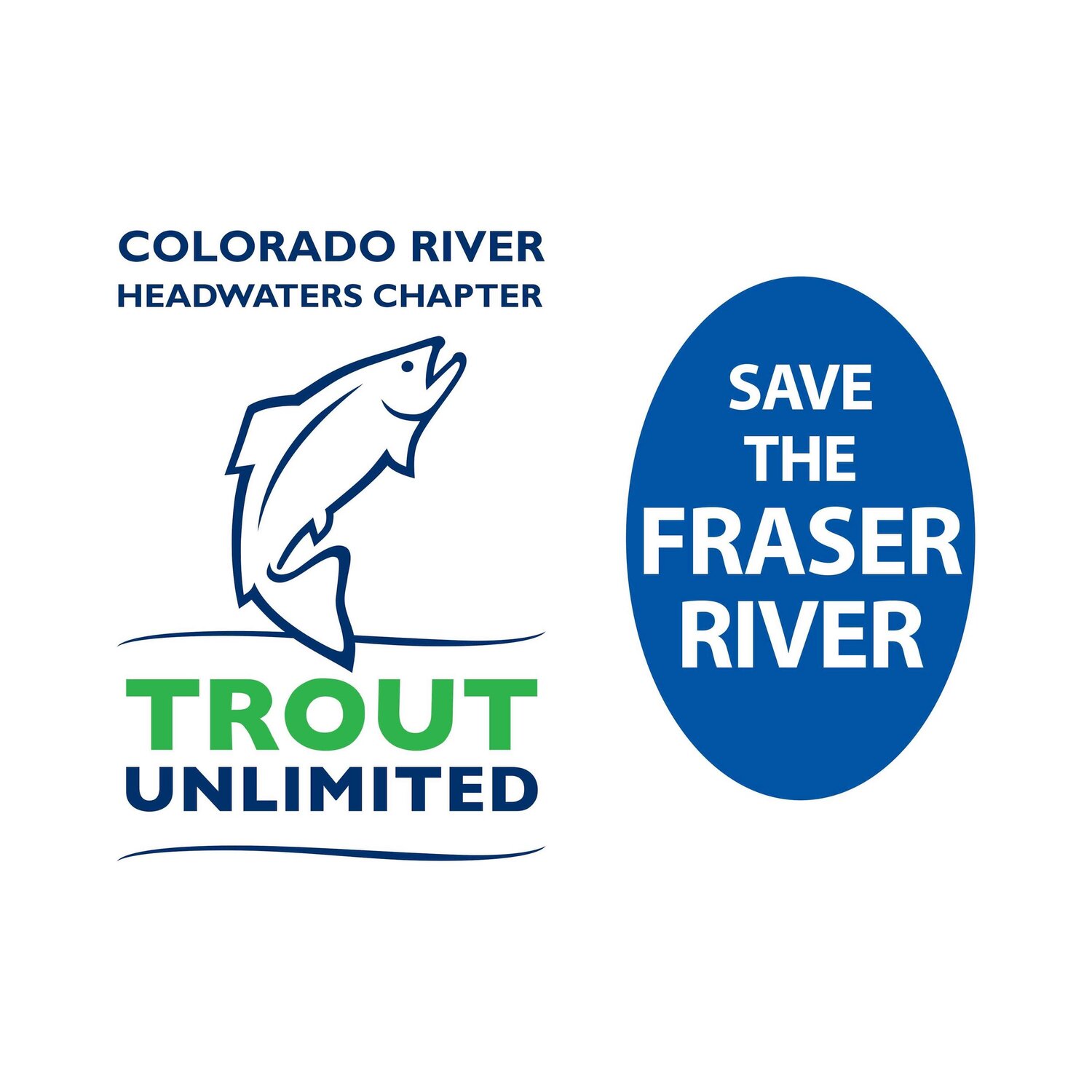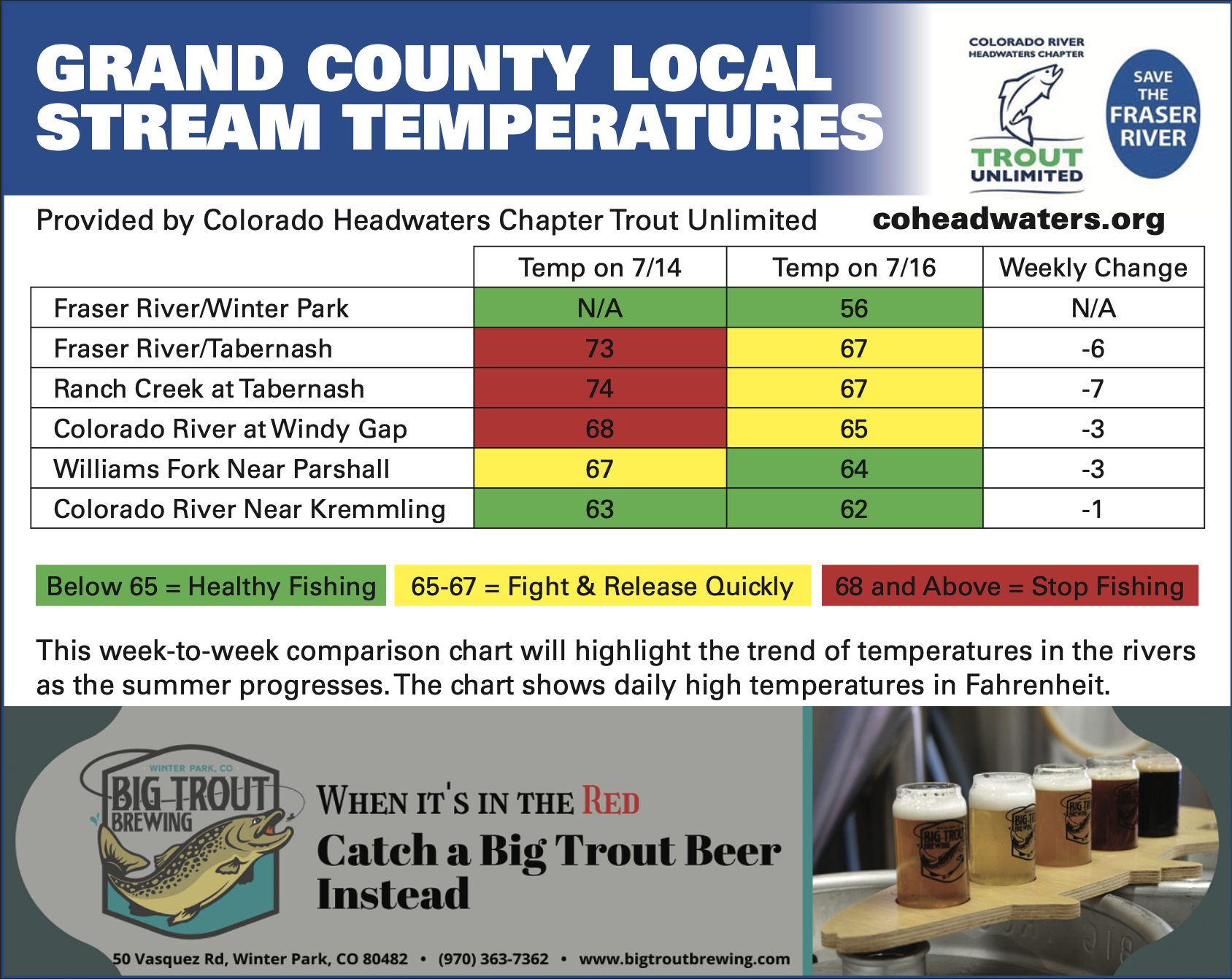July 2024 Update
Welp, Denver Water is at it again. Due to all the diversions that take water from the Fraser and Upper Colorado Rivers, stream temps are at or above critical levels once again. Please be aware of water temperatures when fishing, and adjust your fishing practices accordingly. (Thanks to Big Trout Brewery for supporting our stream temp awareness campaign!)
River Closures
For the most recent closure changes from CPW go to their website.
Because of extremely high fishing pressure in the Fraser Flats area between the north end of Fraser (CR 8) and Tabernash, you are strongly encouraged to not fish this one stretch of river on Tueesday and Thursdays to give the fish a rest. To find alternative fishing holes, check out our local fishing map. Help keep the fish healthy!
Stream Temps Change Often
How warm has it been? How sunny? Has it rained recently? Have there been releases of water into the stream you’re on (this is a big one!)? These are just some of the factors that impact stream temperatures. We encourage fishing with a quality thermometer and checking temps often.
Catch & Release Best Practices
For information on how to safely catch and release fish, click here.
Want more info?
For those of you who want even more information than just temperature, such as flows and turbidity, you can dig into the official USGS website. Grand County Water Information Network (GCWIN) also has helpful local information on a variety of local spots on their website.
Tips for anglers
Anglers should be aware that most of the major rivers on Colorado’s Western Slope are experiencing adverse conditions heading into the hottest days of summer. Follow the Leave No Trace Principle to “Know Before You Go” to the West Slope this summer and check out conditions related to mandatory and voluntary fishing closures: https://cpw.state.co.us/thingstodo/Pages/StatewideFishingConditions.aspx
CPW is encouraging trout anglers to consider fishing early in the day and in higher altitude lakes and streams as hot, dry conditions and reduced water levels increase stress to trout populations.
Heat, drought, and low water levels are contributing to elevated water temperatures in much of Colorado, depleting oxygen levels and leaving trout vulnerable. Trout are cold-water fish that function best in 50-60 degree waters. When temperatures exceed 70 degrees, they often stop feeding and become more susceptible to disease. Warm temperature and low water levels can also lead to algae blooms in rivers and reservoirs which cause oxygen levels to drop when algae die and decompose.
Anglers are asked to carefully consider the water and weather conditions when they go fishing for trout. If water seems too warm or fish appear lethargic, it would be best to leave the fish undisturbed. During mid-summer, try to fish early in the morning when the water is coolest.
“Get out early to avoid the higher water temperatures commonly seen in the afternoon and evening,” Martin said. “Anglers are also encouraged to seek out high-elevation trout lakes and streams, where water temperatures are more suitable and fishing doesn’t potentially add additional stress.”
Martin also urged anglers to add a hand-held thermometer to their fishing kits so they can test the waters they intend to fish.
Anglers are asked to carefully consider the water and weather conditions when they go fishing for trout. If water seems too warm or fish appear lethargic, it would be best to leave the fish undisturbed. During mid-summer, try to fish early in the morning when the water is coolest.
“Get out early to avoid the higher water temperatures commonly seen in the afternoon and evening,” Martin said. “Anglers are also encouraged to seek out high-elevation trout lakes and streams, where water temperatures are more suitable and fishing doesn’t potentially add additional stress.”
Martin also urged anglers to add a hand-held thermometer to their fishing kits so they can test the waters they intend to fish.
“Anglers should monitor water temperatures and stop fishing when water temperatures start to approach 70 degrees,” she said. “If trout have difficulty recovering after being caught and are acting lethargic, it’s a good decision to call it quits for the day.”
Other suggestions include using heavier tippet and line to quickly reel in and release the fish, always wetting your hands before handling a fish, and to keep the fish submerged while unhooking and releasing it. Avoid taking the fish out of the water even for a quick photo in these conditions.
AS FISHERMEN AND WOMEN WE MUST ALSO
BE STEWARDS OF OUR ENVIRONMENT.
All of us know the satisfaction and importance of "catch and release" fishing, but local summer water temperatures resulting from our changing climate have been so high that fishing after about noon or 1 PM on most of our rivers has become "catch and kill". Record high air temperatures and low water flow levels combined with no release of water from reservoirs into our rivers by diverters have resulted in dangerously high summer water temperatures in our streams.
Here is what we can do all summer long. Fish with a thermometer. If water temperatures are above 65 stop fishing or, at the very least, follow the suggestions here. Often, that means we shouldn't fish after noon or 1 PM on most of our rivers during summer’s peak. The Department of Wildlife began posting notices to that effect.
Trout Unlimited is routinely in talks with water diverters and we work to negotiate water releases whenever they are needed. Our warming climate plays a role in stream temperatures, but in our area, the primary challenge is caused by water diversion. We're participated in developing a Grand County drought plan and are working with Denver and other diverters to implement watering restrictions and to release water into our rivers when it’s needed most. Denver Water is not obligated to make releases until they have all their permits, but releasing water at critical times would be good for our environment and would simply be a good public relations move for them. Because we work cooperatively with water diverters, we’re seen as a partner rather than the enemy.
Over half the water from our rivers in the Fraser Valley was diverted during one of the warmest and driest years on record. The result was a spike in water temperatures in our rivers. In this dangerous time for our rivers, TU encouraged Denver to put mandatory watering restrictions in place. During the summer of 2018 and 2020, there were no restrictions on watering in Denver. We're also encouraging Denver to release water into our rivers when it's especially important to our environment. We encourage you to ask Denver Water and other diverters what they are doing to help protect our rivers.




